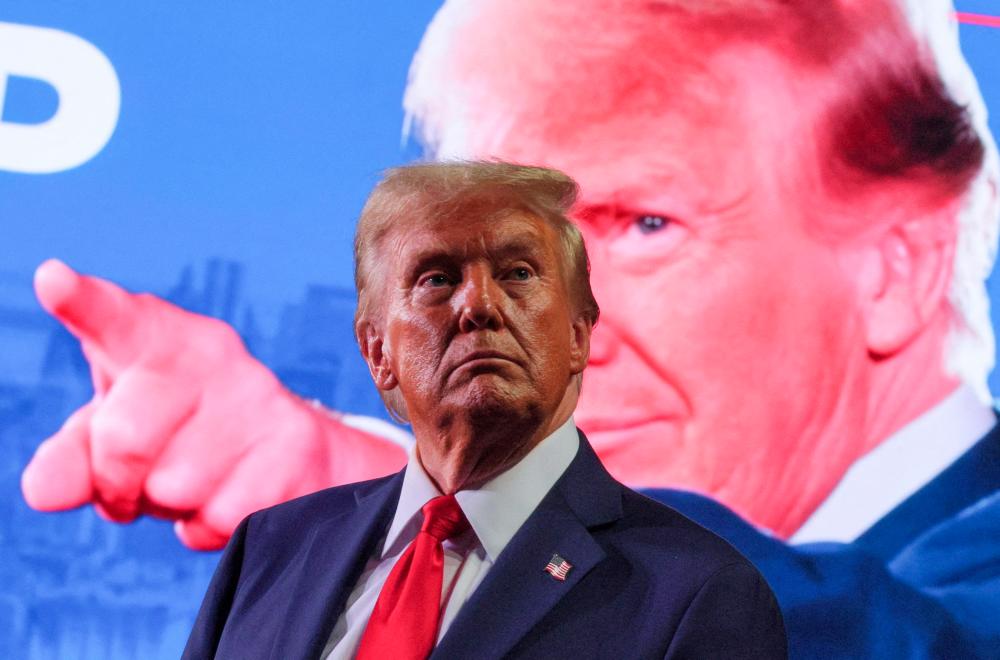PETALING JAYA: With Donald Trump’s landslide victory in the US presidential election, Malaysia could be significantly impacted by geopolitical policy shifts, said Bank Muamalat chief economist Dr Mohd Afzanizam Abdul Rashid.
He told theSun that a reintroduction of tariffs or trade barriers may disrupt Malaysia’s export activities and create uncertainties for industries relying on stable international demand.
“Even during his previous term, Trump championed an ‘America First’ agenda, prioritising protectionist policies to reduce the US trade deficit. If these policies are reinstated, it could lead to a resurgence of trade tensions, particularly with China.
“As Malaysia is deeply integrated into the global trade ecosystem and plays a vital role in the US-China supply chain, we could feel the significant effects from such geopolitical policy shifts.”
Mohd Afzanizam said thus far, Malaysia’s exports to the US have shown considerable growth, moving from RM88.7 billion in 2017 to RM109.1 billion by 2020, with an additional surge in 2023 to RM161.3 billion under current president Joe Biden’s administration.
He said this trend was fuelled partly by Malaysia’s appeal as a production hub within Asean, offering access to various markets and benefiting from strong trade ties with the US and China.
“My recent conversations with key Malaysian authorities indicate a more cautious outlook of sustaining this upward trajectory, given the potential for renewed US protectionism.”
Mohd Afzanizam said in May 2022, the US launched the Indo-Pacific Economic Framework for Prosperity (IPEF), which was aimed at enhancing collaboration with key Indo-Pacific nations, including Malaysia.
However, with Trump’s return, the future of IPEF may face challenges as he prefers bilateral over multilateral agreements.
For Malaysia, the continuity of IPEF and stable US trade policies could be crucial in safeguarding its role in regional supply chains and ensuring steady export growth.
“Any pivot in US trade strategy could prompt Malaysia to recalibrate its trade and investment strategies, potentially seeking stronger ties within Asean and with other global partners to counterbalance US-China tensions.”
Mohd Afzanizam also said Trump’s victory could introduce a wave of uncertainty, sparking volatility in the US dollar (USD) and in emerging market currencies like the ringgit.
“If he pursues ‘unpredictable foreign policies’, the dollar may fluctuate and adversely impact Malaysia’s foreign exchange reserves and borrowing costs.”
He said if Trump aggressively deports undocumented immigrants, it could slow US economic growth and reduce federal tax revenue over time.
“This development holds particular significance for Malaysia, given that our GDP growth has historically shown a 70% correlation with US economic performance. Hence, a slowdown in US growth would dampen Malaysia’s economic expansion as well.”
On the political front, analyst and Malaysia Council of Professors fellow Dr Azmi Hassan said in terms of the war in Gaza, Trump would fully support Israeli Prime Minister Benjamin Netanyahu.
While Hamas is seen as a terrorist organisation by Western countries, Malaysia has stood firmly behind it.
“I believe Trump will understand Malaysia’s position even though the US Congress passed a law that any country found supplying weapons to Hamas would face sanctions.
“That law does not apply to Malaysia as our support for Hamas is only as a civilian government administrating Gaza and not as a terrorist organisation. I believe Trump understands this difference, even though Prime Minister Datuk Seri Anwar Ibrahim has openly supported Hamas and embraced its assassinated leader Ismail Haniyeh.”
Azmi said during his first tenure as president, Trump went all out by ignoring the status quo of other countries’ foreign policies regarding Jerusalem.
“He moved the US embassy from Tel Aviv to Jerusalem and allowed Israel to control East and West Jerusalem, so he is very biased towards Israel.
“However, we support the Palestinians on humanitarian grounds for their right to
self-determination and not for Hamas per se. So this status quo will remain.
“Besides, we have dealt with Trump during his first tenure as the US’ 45th president, so even our friendly ties with Russia, China and other countries will remain the same, although there might be some tweaking because Trump sees foreign policy a little differently from Biden.”









